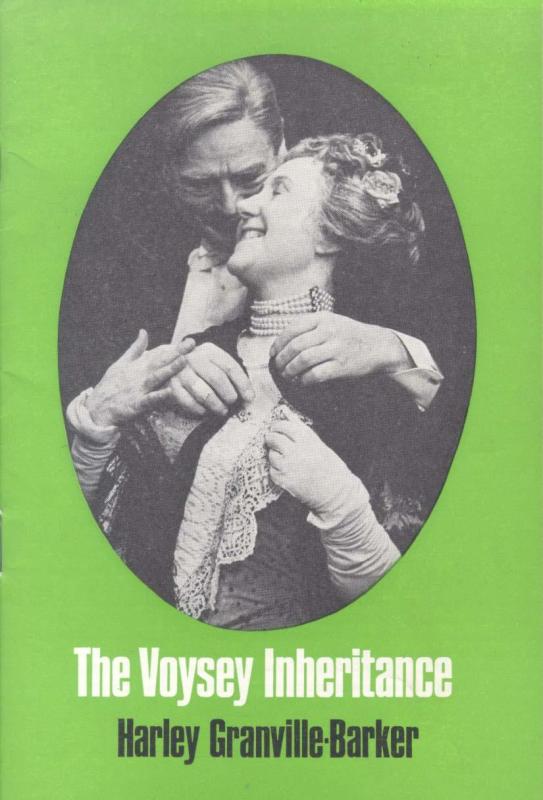|
|
The Voysey
Inheritance By Harley
Granville-Barker The Directed by
Jane Howell The English
Stage Company |
| ||||||||
|
|
The Cast |
|
The action of the play takes place in the office of Voysey and Son in | |||||||
|
Mr. Voysey Mrs. Voysey Trenchard Voysey Major Booth
Voysey Edward Voysey Hugh Voysey Honor Voysey Ethel Voysey Emily Voysey Beatrice Voysey Denis Tregoning Alice
Maitland Mr. Booth Rev. Colpus Peacey Phoebe Mary |
….Sebastian Shaw ….Gwen Nelson ….Roger Booth ….Jeffry Wickham … ….David Leland ….Gillian Martell ….Janette Legge ….Jean Boht ….Ann Firbank ….Timothy ….Avril Elgar ….George Howe ….Bernard Gallagher ….Joseph Greig ….Jaqueline ….Janet Chappell | |||||||||
|
|
Plays |
To celebrate the tenth anniversary of their tenancy of the |
|
|||||||
|
and Players |
|
|||||||||
|
June 1966 |
|
|||||||||
|
Reviewed
by: |
|
|||||||||
|
Frank
Marcus |
|
|||||||||
|
|
|
|||||||||
|
Looking
Back |
|
|||||||||
|
Both times it was the result of the content, not the form, of the
plays performed. They were both very
English, domestic revolutions.
What they did was to erode the rigid class structure of
society: they changed the quality of
life. These revolutionaries were not
interested in ‘art for art’s sake’:
‘art for life’s sake’ might have been their slogan. |
|
|||||||||
|
And that’s where the similarity ends. Granville-Barker wasn’t Shaw either, and I
can’t see, say, Wesker or
Arden claiming him as a spiritual godfather.
What are we to make of this enigmatic man? “It is in the representation of
intellectual emotions that he excels,” Desmond MacCarthy
wrote of his performance as Marchbanks in Candida. Later, he lived abroad, translated plays in
collaboration with his second wife, and acted as a guru to a whole generation
of actors and directors, revered by John Gielgud, among many others. I found The
Voysey Inheritance a curiously impersonal play, lacking both flavour and vitality.
The inheritance in question is fraud:
financial speculation with clients’ capital,
carried on over three generations by a respected firm of solicitors. When the play opens, the son, Edward, a somewhat priggish young
man of high principles, has just discovered his father’s criminal
activities. Shattered, he threatens
first exposure, and then withdrawal from the firm. Subtlety, his father makes his inescapable
involvement—however innocent—plain to him.
The father dies; Edward tells the awful truth to the mourning
family. Here comes the first
surprise. Some of them knew, others
suspected, and those who didn’t are realistic enough—after being decently
shocked, of course—to suggest that the embezzling, which has gone undetected
for thirty years, be continued. This
is a very good scene. The ruthlessness
and amorality of the upper middle-class family where money is concerned is
truly shocking. What follows is, unfortunately, one long anti-climax. Edward shoulders the responsibility,
continuing the fraudulent investments, but using all the profits towards
straightening the depleted accounts.
Inevitably, the crash comes.
Edward faces disgrace and possibly imprisonment, but his beloved
cousin, who had previously turned down four-and-a-half proposals of marriage
by him, now pledges herself to him in his hour of need. He has proved himself in her eyes as a man. This ending is not intended to be ironical. The cousin, Alice, is broadminded,
compassionate, and wise. She is
clearly the author’s mouthpiece, remarking, for example, that the trouble with
the principles s that one is too concerned with attitudes to notice whether
one is of use. In the end, the trials
of Edward are only a sort of moral Duke of Edinburgh award scheme, with This is all the more annoying because Barker touches on some
explosive issues. After the father’s
death, the family crumbles. Are we to
deduce that a family—a microcosm of society—is only held together by fraud
and hypocrisy, but not by an open complicity in crime? We are never told. Then there is the father-son relationship. It is an almost exact replica of that
between Mrs. Warren and her daughter Vivie in
Shaw’s play. The difference is
illumination. Granville-Barker is a
much better craftsman: the construction
is much neater and better balanced.
But Shaw was angry. He had it
in for society. His passionate
reformer’s zeal, as revealed in his clumsy play, is worth the entire literary
output of Granville-Barker. Still, it’s futile to grumble that Granville-Barker wasn’t as
good as Shaw. The revival at the I found Jane Howell’s direction rather on the slow side; indeed,
towards the end, it nearly ground to a halt.
It’ll probably speed up when the cast have played themselves in. On the credit side—one can’t help using
financial terms!—there is an unpretentious honesty and seriousness. And the actors do seem to enjoy playing something so very
different. Avril
Elgar, as The others are types, rather then characters. There is a deaf mother (Gwen Nelson)
interjecting irrelevancies gleaned from Notes
and Queries (‘The Chinese empire must be in a shocking state!’). As a booming army type, Jeffry
Wickham gets a lot of laughs; Roger Booth and
Gillian Martell, as two more Voysey children, are also well in the picture. The hero, Edward, is played by John Castle. It is notoriously unrewarding to have to
portray decency and integrity. Mr.
Castle plays him on a note of glum sincerity.
He is like a public school boy, wrongly accused of stealing. One hates him for being so good. They say that virtue is its own reward…. The Voysey
Inheritance, then, has none of the icy magisterial fervour
of Ibsen, none of the vibrant poetry of Chekhov. It foreshadows Galsworthy and
Priestley. The final entry in the
ledger says: ‘Decent, but dull’. |
|
|||||||||
|
|
Part of the... |
|
||||||||



